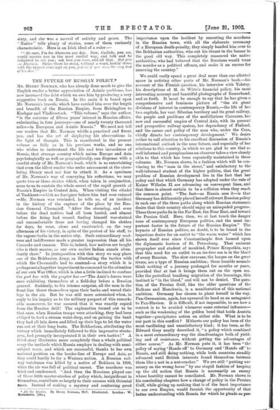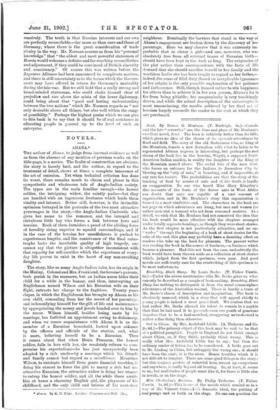THE FUTURE OF RUSSIAN POLICY"
Mn. HENRY NORMAN, who has already done much to give the English reader a better appreciation of Asiatic problems, has now increased the debt which we owe him by producing a very suggestive book on Russia. In the main it is based upon Mr. Norman's travels, which have carried him over the length and breadth of the Russian Empire, from Helsingfors to Kashg,ar and Vladivostock. "This volume," says the author, "is the outcome of fifteen years' interest in Russian affairs, culminating in four journeys—one of nearly twenty thousand miles—in European and Asiatic Russia." We need not tell our readers that Mr. Norman wields a practised and fluent pen, and has the art of displaying his observations in the light of thought. This is manifested in the present volume as fully as in his previous works, and no one who wishes to understand the life and true inwardness of Russia, that strange country which unites Europe and Asia psychologically as well as geographically, can dispense with a careful study of Mr. Norman's book, which is so entertaining that even the idlest reader who seeks amusement at the circu- lating library need not fear to attack it. As a specimen of Mr. Norman's way of conveying his reflections, we may quote two or three stories which, when taken in conjunction, seem to us to contain the whole secret of the rapid growth of Russia's Empire in Central Asia. When visiting the citadel of Tashkent—which no foreigner before him had ever entered —Mr. Norman was reminded, he tells us, of an incident in the history of the capture of the place by the Rus- sian General Chernaieff. "After the storming, and even before the dead natives had all been buried, and almost before the firing had ceased, finding himself war-stained and uncomfortable from not having changed his clothes for days, he went, alone and unattended, on the very afternoon of his victory, in spite of the protest of his staff, to the vapour-baths in the native city. Such extraordinary cool- ness and indifference made a greater impression than all his Cossacks and cannon. This is, indeed, how natives are taught who is their master, as our own earlier Indian annals abun- dantly show." In juxtaposition with this story we may place one of the Bokharian Army, as illustrating the tactics with which the Chernaieffs had to contend—a story which it is perhaps not altogether impertinent to commend to the attention of our own War Office, which is also a little inclined to confuse the post hoc with the Tropic,. hoc :—" The Amir's forces were once exhibiting themselves at a field-day before a Russian general. Suddenly, to his intense surprise, all the men in the front line threw themselves upon their backs and waved their legs in the air. But he was still more astonished when, in reply to his inquiry as to the military purport of this remark- able manceuvre, be was assured that it was exactly copied from the Russian drill! The explanation turned out to be that once, when Russian troops were attacking, they had been obliged to ford a stream waist-deep, and on gaining the bank they had all lain down and lifted up their legs to let the water run out of their long boots. The Bokharians, attributing the victory which immediately followed to this impressive strata- gem, had promptly incorporated it in their own tactics !" A third story illustrates more completely than a whole political essay the methods which Russia employs in dealing with semi- subject races, and which are successful, thanks to her own national position on the border-line of Europe and Asia, as they could hardly be for a Western nation. A Russian rail- way watchman was killed by a native of Bokhara in 1898, when the air was full of political unrest. The murderer was tried and condemned. "And then the Russians played one of those little master-strokes of policy which, insignificant in themselves, contribute so largely to their success with Oriental races. Instead of making a mystery and conferring great • AIL the Rustriaq. By Henry Norman, M.P. Illustrated. London : W.
Heinemann. [ise4 importance upon the incident by executing the murderei in the Russian town, with all the elaborate ceremony of a European death-penalty, they simply banded him over to the Bokharian authorities, who cut his throat in the bazaar in the good old way. This completely reassured the native authorities, who had believed that the Russians would treat the murder as a political offence, and make it an excuse for annexing the country."
We could easily spend a great deal more than our allotted space in noticing other parts of Mr. Norman's book,—his account of the Finnish question, his interview with Tolstoy, his descriptions of M. de Witte's financial policy, his most interesting account and beautiful photographs of Samarkand, and so forth. It *must be enough to say that he has given a comprehensive and luminous picture of "the six great divisions of interest in contemporary Russia,—the life of her two capitals, her vast Siberian territory and its great railway, the people and problems of the multifarious Caucasus, her new and successful empire of Central Asia, with its present and prospective railway system, her dependency of Finland, and the career and policy of the man who, under the Czar, chiefly directs her contemporary development." We desire rather to call attention to his excellent discussion of Russia's international outlook in the near future, and especially of her relations to this country, in which we are glad to see that so well informed and perspicacious an observer takes a view closely akin to that which has been repeatedly maintained in these columns. Mr. Norman shows, in a fashion which will be con- vincing to the "man in the street," and satisfactory to the well-informed student of the higher politics, that the great problem of Russian development lies in the fact that her policy and that which Germany has adopted under the rule of Kaiser Wilhelm H. are advancing on convergent lines, and that there is almost certain to be a collision when they reach the common point. "The fact—as Russia sees it—is that Germany has deliberately planed herself athwart Russian policy in each one of the three paths along which Russian statesmen desire that their country should enjoy an unimpeded progress. These three paths lie in the Far East, the Near East, and toward the Persian Gulf. Here, then, we at last touch the danger zone of contemporary European politics, and the most im- portant factor in the future of the Russian Empire." The keynote of Russian politics, no doubt, is to be found in the imperious desire for an outlet to "the warm water" which has shown itself ever since Constantinople first loomed upon the diplomatic horizon of St. Petersburg. That eminent geographer and student of mankind, Prince Kropotkin, says that this need for an outlet to an ice-free sea is in the blood of every Russian. The slow caravans, the barges on the great rivers, are a type of Russian ambition; these humble nomads think nothing of a journey prolonged for months or years, provided that at last it brings them out on the open sea. Like the periodical headlong migration of the lemmings, this instinct is "in the blood," and will not be denied. The ques- tion of the Persian Gulf, like the older questions of the Balkans and Manchuria, is a manifestation of this national ambition. Germany has chosen to plant herself in the way. Pan-Germanism, again, has upreared its head as an antagonist to Pan-Slavism. It is difficult, if not impossible, to see how a contest is to be avoided whenever some external influence— such as the weakening of the golden bond that holds Austria together—precipitates action on either side. What is to be our part in this conflict ? Hitherto our policy has been of the most vacillating and unsatisfactory kind ; it has been, as Sir Edward Grey neatly described it, "a policy which combined in a most extraordinary way the disadvantages both of yield- ing and of resistance, without getting the advantages of either course." As Mr. Norman puts it, it has been "the policy of saying 'Hands off ' to Germany and Hands off ' to Russia, and still doing nothing, while both countries steadily advanced until British interests found themselves between them like a nut in a nut-cracker." We are still "putting our money on the wrong horse" by our stupid fashion of keeping up the old notion that Russia is necessarily an enemy whose hostility cannot be conciliated. Mr. Norman shows in his concluding chapters how a change of policy in the Persian Gulf, while giving up nothing that is of the least importance to our own Empire, would furnish the opportunity of that better understanding with Russia for which he pleads so per.
suasively. The truth is that Russian interests and our own are perfectly reconcilable,—far more so than ours and those of Germany, where there is the great consideration of trade rivalry in the way. Mr. Norman assures us from his "personal knowledge" that "the ablest and most powerful statesmen of Russia would welcome a definite and far-reaching reconciliation and adjustment, if they could be convinced of British sincerity and. consistency." Of course this was written before the Japanese Alliance had been announced to complicate matters, and there is still uncertainty as to the terms which the Govern- ment may have offered in return for Germany's neutrality during the late war. But we still hold that a really strong and broad-minded statesman, who could shake himself clear of prejudice and rise above the mists of the lower diplomacy, could bring about that "good and lasting understanding between the two nations" which Mr. Norman regards as "not only desirable above all things, but also well within the range of possibility." Perhaps the highest praise which we can give to this book is to say that it should be of real assistance in educating people in general up to the level of such an enterprise.







































 Previous page
Previous page